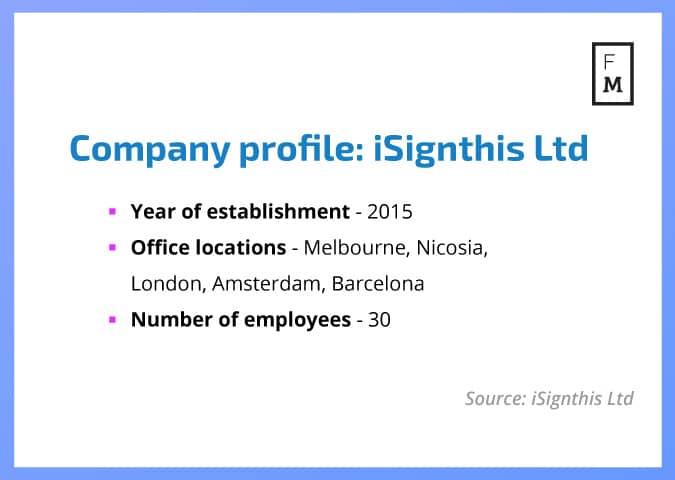Finance Magnates sat down with the Managing Director and CEO of the Payments company to discuss electronic verification, regulation, and data protection.
Please tell us about yourself and how you reached your current role.
I am qualified as an attorney and chartered as an electrical engineer – so I have always had a passion for solving problems, and putting structure around the solutions.
[gptAdvertisement]
RegTech, or the application of technology to solving regulatory and compliance challenges, is the ideal challenge for my skillset and experience. I have worked in a number of sectors, including defence, telco, oil and gas, digital media and payments, so I have had broad exposure to industry, and how to ‘get things done’.
What are the main challenges that online trading brokers face in terms of KYC?
The main challenge currently facing online trading brokers is the tightening of regulatory regimes. The requirements of the 4th Anti-Money Laundering Directive (4AMLD), taken in context of the Payment Service Directive 2 (PSD2) and the new General Data Protection Regulation (GDPR), will make 2018 really difficult for firms that are not prepared. Firms that don’t plan effectively will end up presenting their customer with unnecessary challenges and increased on-boarding friction, to meet these incoming regulatory regimes. The GDPR will also carry fines of up to 4% of revenue, or minimum €10m if firms fail to comply, this should get everyone’s attention.

Finance Magnates
As a RegTech, iSignthis has developed solutions that converge and streamline the requirements for enhanced due diligence for the 4AMLD, card verification for PSD2 and privacy requirements via its secure data repositories. This optimises the on-boarding process for customers, with only minimal interactions necessary to meet the combined 4AMLD, PSD2 and GDPR requirements.
What are the hottest trends in the payments industry in general and the online trading sector in particular?
Everyone will tell you it’s alternative payment methods. Although, we believe this will shift to Payment Service Providers (PSPs) that can provide a compliant solution to the PSD2s ‘one leg out’ challenge. The ‘one leg out’ scenario means that all cards from outside the European Economic Area (EEA) will need to have their ownership proven prior to acceptance. Given that 3DSecure enrolment outside the EEA is pitifully low, this is going to be problematic for most PSPs.
iSignthis has solved this challenge independently; however we are also working with the European Card Stakeholders Group, which includes the card schemes, in discussing innovative solutions around this challenge.
How have new technologies transformed the on-boarding funnel, and how has automation contributed to this?
The use of payment data, in addition to device, internet, cellular, bank, credit reference and government data, has allowed iSignthis to largely automate the on-boarding process for any person that has been subject to customer due diligence by a bank located in a low risk jurisdiction.
This is not the classic ‘electronic verification’ pioneered last century by players such as GBG and Experian, but rather a new approach that has evolved as a result of regulatory change and progression. This has led to a combination of several technologies and the alteration of traditional on-boarding processes to achieve enhanced due diligence.
iSignthis holds a number of patents in this area, in a number of countries and regions, including EU member states and the US, and we have trademarked these processes as ‘Paydentity’.
We see that achieving the three core aims of payment, customer due diligence and transaction monitoring at the same time from a unified platform, means that we can deliver all the necessary requirements without completely disrupting the traditional on-boarding funnel.What are your goals for the company in the next few years?
Moving forward iSignthis aims to further increase automation and confidence, whilst continuing to enhance our products. We plan on staying ahead of the regulatory curve by releasing further innovations for which we have secured patents.
What do you think sets you apart from the competition?
iSignthis is disrupting the industry by converging payments and identity under our patented process for the purpose of complying with Anti-Money Laundering (AML) and Countering the Financing of Terrorism (CFT) requirements.
iSignthis is the first company of its kind to do this, as traditionally merchants would have to work with multiple solution providers to achieve the necessary outcomes of payment, settlement, clearance, identity verification, screening and transaction monitoring. By converging payment and identity, iSignthis have been able to create a seamless process via one API and thereby replace fragmented and disjointed services.
Our Paydentity solution allows firms to meet a number of their obligations under the 4th AML Directive, CySEC Directive and JMLSG requirements for enhanced due diligence. The introduction of these requirements will massively shake up the forex, CFD, binary options and securities industry.
Another major factor is the reach and coverage we provide for firms. iSignthis is able to remotely verify and on-board 3.5 billion ‘bank verified’ active card and account holders, in as little as 3 to 5 minutes.
When this is paired with our advanced gateway, which includes strong customer authentication, card tokenization, transaction monitoring, real time reporting and intelligent routing, iSignthis can offer a complete identity and payment solution for the sector, which we are currently providing XM.com.uk with.
How do you view the current state of the industry?
Electronic verification hasn’t changed in the past 20 or so years and is long overdue for a shakeup. Its reach is limited to the UK and Australia and it is becoming subject to impersonation fraud far too easily. The 4AMLD, CySEC June 2016 directive and 2017 draft UK JMLSG address this by putting requirements on data vendors to have recent data, as well as data that isn’t available ex Social Media etc.
The payments landscape has seen some innovations, but almost none of those have been specific to the trading industry. iSignthis intends to shake this up as well.
What new fields or opportunities do you see as growth potential in the market?
For us it’s about payments and identity, whilst meeting the challenges of the incoming General Data Protection Regulation (GDPR).
Those minimum €10m and €20m fines, or 4% of the firm’s revenue, should be well and truly on the radar of every board member of every firm. These are scary penalties, which is indicative of how seriously the EU takes data privacy.
We have invested significant funds in becoming GDPR ready, and to act as a secure repository of data for our clients, by achieving not only PCI DSS Level 1, but also ISO27001, in addition to industry best practice. As we are an authorised Monetary Financial Institution to offer eMoney, payment and other services by the Central Bank of Cyprus, we take these responsibilities very seriously.






















